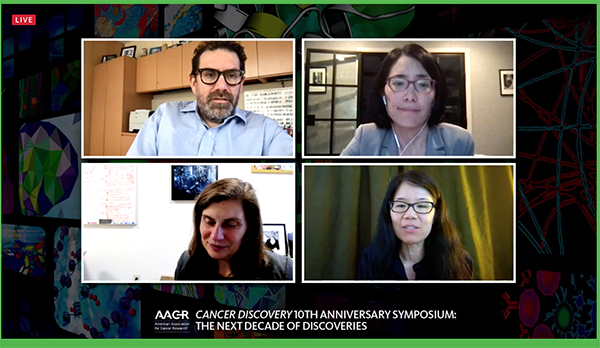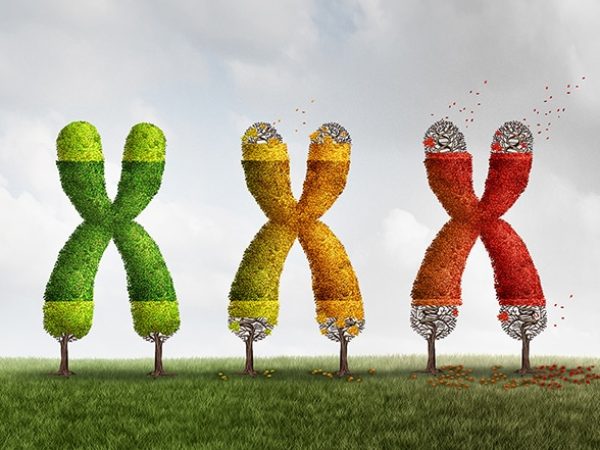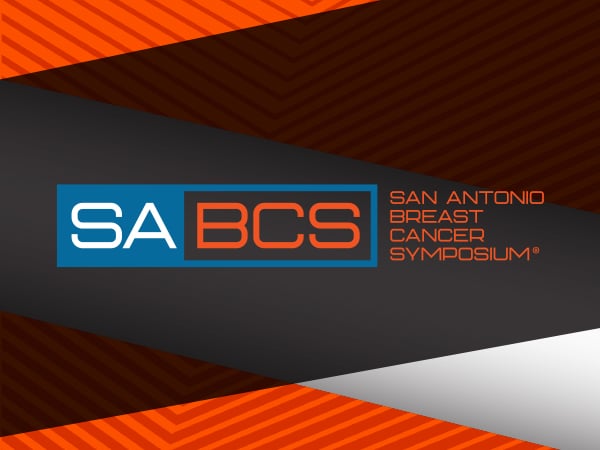AACR’s Cancer Discovery Celebrates 10 Years
Ten years ago, then-President of the AACR, Tyler Jacks, PhD, FAACR, conceived the idea for a “comprehensive, high-impact journal that would present new data along the continuum of science and underscore the excitement and potential for basic research and its implications,” according to Margaret Foti, PhD, MD (hc), chief executive officer of the American Association for Cancer Research (AACR).
Thus, Cancer Discovery was born.
This year, the AACR journal celebrates its 10th anniversary with a series of commemorations, including a special 10th anniversary issue, spotlights on the journal’s groundbreaking articles, and the Cancer Discovery 10th Anniversary Symposium, held June 21-22.
In her opening remarks of the symposium, Foti highlighted Cancer Discovery’s launch and its impact on the cancer research community through the years.
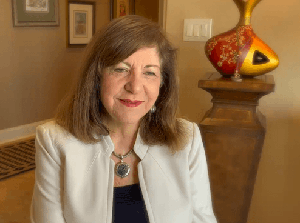
The journal was launched in 2011 under the remarkable leadership and guidance of Lewis Cantley, PhD, FAACR, and the late José Baselga, MD, PhD, FAACR, Foti said. “The impressive inaugural issue of Cancer Discovery published high-impact topics covering the full spectrum of cancer medicine, from the practice-changing clinical trials on personalized therapy for lung cancer, to KRAS translocation, and to the use of laboratory screening and epidemiology to identify alternative uses for digoxin.”
Select articles from the inaugural issue and other issues through the years can be accessed here.
Since 2011, Cancer Discovery has published over 3,000 articles from researchers around the world. The impact factor for Cancer Discovery has more than tripled, and is now 39.397, according to Journal Citation ReportsTM from Clarivate, 2021, released on Wednesday.
“The incredible growth of the journal’s impact factor reflects Cancer Discovery’s importance to cancer researchers around the world,” said Foti. “The journal’s content presents the most compelling and innovative cancer research in the world.
“We are extremely grateful to the cancer research community for its overwhelming support of the journal, and we will continue to make every effort to publish studies of timeliness and significance in cancer discovery that foster fruitful discussion, encourage synergistic collaboration, and offer novel approaches for patient benefit. Clearly, these contributions will accelerate the speed of discovery and save more lives from cancer,” Foti said.
Editors-in-chief highlight advances in cancer care
Among the slate of prominent researchers presenting at the symposium were Cancer Discovery’s co-editors-in-chief, Cantley and Luis Diaz, MD.
“Cancer Discovery has…a unique place in the publication reporting landscape where we highlight advances in clinical science in oncology in a way that really moves the needle forward,” said Diaz. He and Cantley also reflected on the journal’s successes in a recent editorial, in which they noted pivotal discoveries published in the journal during a decade that saw major advances in cancer genome sequencing, precision medicine, and immunotherapy. “We are incredibly proud of the role Cancer Discovery has played in several such practice-changing advances,” they wrote.
In their presentations, Cantley and Diaz—who research cancer signaling and immunotherapy, respectively—each provided an in-depth perspective on advances in cancer research and how our understanding of cancer development and treatment has evolved over time.
The not-so-sweet role of sugar in cancer
Cantley, a professor at Weill Cornell Medicine, discussed the impact of sugar consumption on cancer development and treatment. He explained that a potential association was first noted over 100 years ago, when scientists observed that certain tribal communities that did not consume refined sugars had zero cancer cases, despite increasing cancer rates among the general population. This observation, along with Otto Warburg’s 1923 discovery that cancers consume more glucose than normal tissue, led researchers to hypothesize that increased consumption of refined sugars provided high levels of glucose that fueled cancer development.
Consistent with this hypothesis, the rise in cancer incidence and mortality throughout the 20th century correlated with a marked increase in sugar intake and the spread of the Western diet, noted Cantley. However, researchers found that while serum glucose increased by 20-30 percent after consuming sugar and other carbohydrates, the levels of serum insulin increased by over 300 percent, suggesting that insulin might be involved.
Under normal conditions, insulin binds to receptors on liver cells, which activates the phosphatidylinositol 3-kinases (PI3K) and promotes subsequent glucose uptake by the liver, returning serum glucose to normal levels. In the presence of a tumor, however, insulin binds to receptors on tumor cells, leading to uptake of glucose by the tumor, thereby fueling tumor growth. Tumors with PI3K mutations are especially sensitive to the presence of insulin, noted Cantley, who discovered the PI3K pathway and helped elucidate its role in glucose regulation and cancer.
PI3K inhibitors have been approved to treat certain cancers with PI3K mutations, but many patients do not respond to the treatment. Cantley and colleagues found that PI3K inhibitors induce insulin resistance by inhibiting PI3K in normal muscle and liver cells. This prevents the liver from taking in glucose and results in higher serum levels of insulin and glucose, he explained.
Cantley proposed that the rise in serum insulin induced by PI3K inhibitors may increase glucose uptake by the tumor and ultimately fuel tumor progression, which could explain why some patients do not respond to this therapy. He and colleagues are interested in determining whether reducing one’s consumption of sugar could ameliorate these effects and improve responses to PI3K inhibitors, as they did in preclinical models. They have, therefore, initiated a clinical trial to assess the effect of ketogenic diets, which are low in sugar and carbohydrates and high in fat, on the response to PI3K inhibitors.
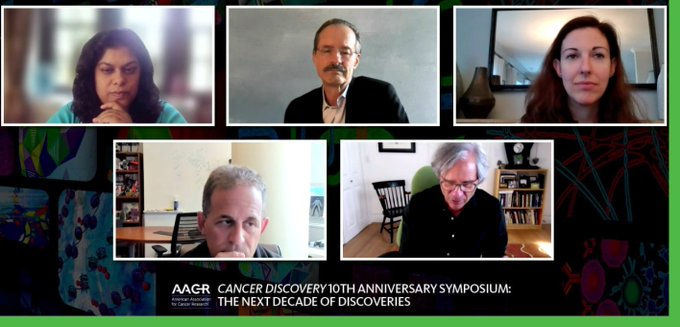
A good match: Immune checkpoint inhibitors and mismatch repair-deficient tumors
The ever-growing list of indications and promising clinical trial results for immune checkpoint inhibitors makes it easy to forget that this class of immunotherapy is a relatively new addition to the cancer therapy realm. In his presentation, Diaz, who is an oncologist at Memorial Sloan Kettering Cancer Center, discussed some of the pivotal discoveries and clinical trials that have led to the expansion of immune checkpoint inhibitors in recent years.
As cancer develops and progresses, normal tissue evolves to premalignant lesions to invasive cancer to metastatic cancer, Diaz explained. This evolution is due, in part, to the accumulation of somatic mutations. Large-scale sequencing of cancer genomes revealed that across various cancer types, tumors with the greatest number of somatic mutations were those with mismatch repair (MMR) deficiency. Deficiency in MMR, which can be sporadic or inherited as Lynch syndrome, leads to the accumulation of DNA mutations and altered microsatellite regions, resulting in an exceptionally high tumor mutational burden. In addition, tumors with defects in MMR have high levels of inflammation, infiltration of immune cells, and expression of the PD-L1 immune checkpoint protein.
Based on these findings, Diaz and colleagues hypothesized that tumors with MMR deficiency may be susceptible to treatment with anti-PD-1 immune checkpoint inhibitors. Indeed, results from KEYNOTE-164, led by Diaz, demonstrated that treatment-refractory colorectal tumors with deficient MMR responded to the immune checkpoint inhibitor pembrolizumab, whereas MMR-proficient colorectal tumors did not. Patients with MMR-deficient tumors had profound tumor shrinkage and increased progression-free and overall survival in response to pembrolizumab than patients with MMR-proficient tumors. The researchers also found that the response to pembrolizumab was associated with tumor mutational burden in tumors with microsatellite instability. These findings led to the approval of pembrolizumab for MMR-deficient tumors, marking the first tumor agnostic approval by the U.S. Food and Drug Administration.
Subsequent findings from the KEYNOTE-177 trial showed that in addition to being effective against previously treated cancers, pembrolizumab was also effective as a first-line treatment for MMR-deficient metastatic colon cancer. In this trial, pembrolizumab treatment led to longer progression-free and overall survival, a higher overall response rate, a greater number of complete responses, and a longer duration of response, as compared to chemotherapy.
While the efficacy of pembrolizumab for MMR-deficient metastatic colorectal cancer has been well established, its impact on earlier-stage cancer is less clear. An ongoing clinical trial is examining the potential of pembrolizumab as a neoadjuvant or adjuvant therapy for patients with non-metastatic MMR-deficient colorectal cancer. Preliminary data indicate responses to neoadjuvant pembrolizumab in all study participants. If these results hold true, early pembrolizumab treatment may allow some patients to avoid subsequent chemotherapy, radiation, and/or surgery, suggested Diaz.
Diaz also noted the potential to test pembrolizumab at even earlier stages of treatment or cancer development, such as in precancerous or early cancer lesions.
“What I’d like to challenge our community [to do] is to try to develop this kind of paradigm for every indication,” he said. “Currently, we have studies in the adjuvant setting and many in the neoadjuvant setting, but we shouldn’t stop there. We have to keep going earlier.”
